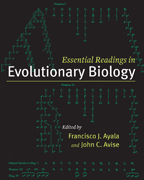Essential Readings in Evolutionary Biology
 Francisco J Ayala and John C Avise (Eds)
Francisco J Ayala and John C Avise (Eds)
Johns Hopkins University Press, £29.99
This book contains 48 'classical' evolution papers in chronological order, with introductions by the editors and a brief lament over the US's reluctance to accept evolution.
I read this (yes, all of it) mostly with pleasure, recognising most of the papers, having read them during my professional life. It starts with a beautiful chapter from Charles Darwin's The Origin of Species, followed by a not very appropriate chapter, 'Morality', from The Descent of Man. I would have liked to see an earlier paper, perhaps from Jean-Baptiste Lamarck.
Then there is a long and overly complicated paper by James Baldwin (I'm pleased he gets a look in, though). We have Godfrey ('GH') Hardy, and – economically – Sewall Wright reviewing Ronald Fisher's magnum opus, The Genetical Theory of Natural Selection. George Simpson is authoritative on species. Paul Ehrlich and Peter Raven on coevolution of butterflies and plants is delightful, although a bit long.
We have James Watson and Francis Crick, with the lovely line "it has not escaped our notice... suggests a possible copying mechanism for the genetic material". Richard Lewontin and John Hubby's remarkable demonstration that a third of gene loci have more than one version, and that heterozygosity is between 20% and 40% in wild populations, required that we all change our models – mostly of homozygosity. Most genetics departments didn't change their teaching, although tens of papers corroborated their results in many wild species.
Two impressive Stephen Jay Gould papers, Punctuated Equilibria and the anti-panselectionist Spandrels of San Marco are here, as is Ernst Mayr, with a cladistics critique. Mary Jane West-Eberhard has a long, wise article on social (and sexual) selection.
Barbara McClintock's 1983 Nobel Prize speech is here, documenting stuff up to that date on transposons – and work done 40 years earlier. William Hamilton is, of course, included, but with a very difficult paper – a later, simpler one would have been better.
Sean Carroll has two papers, one emphasising regulatory genes and the other – beautiful – on the genetics of our own evolution. There is a great paper by Dolph Schluter on ecology and evolution, with some reference to sticklebacks, naturally. And the last paper, from 2003, is a very obvious overview of microbiological evolutionary experiments.
What a pity they stopped there, though – pretty much every paper in this book talks about genes. Epigenetics, the other 90% or more of the genome that we now suspect controls all those regulatory systems, isn't covered.
Despite this, and its relegation to history, Essential Readings in Evolutionary Biology should be in every university library. It has all the 'essential' historical papers – it's just a pity there isn't one that picks up on epigenetics.


